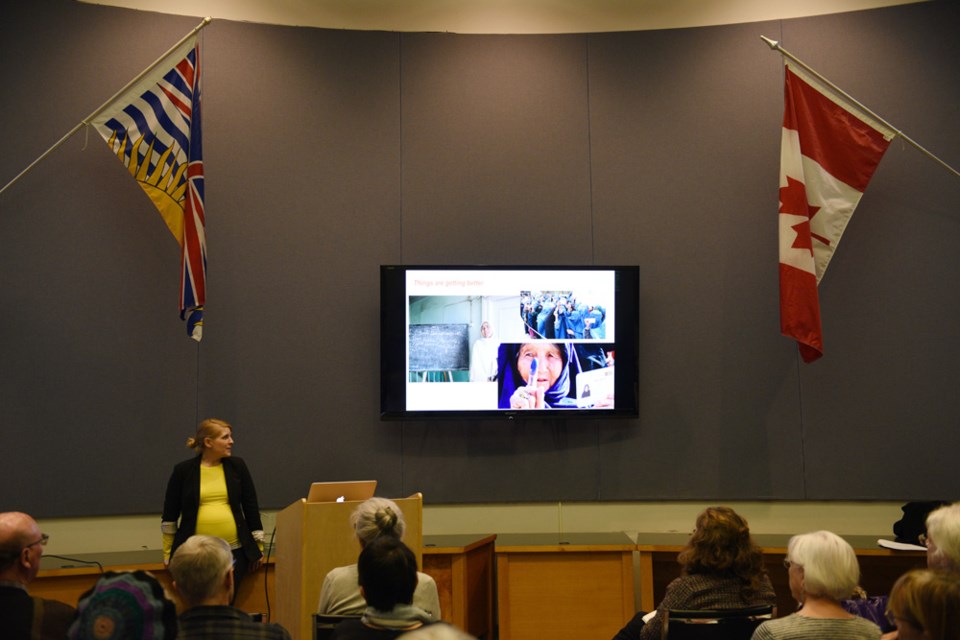One of the most popular names for girls in Afghanistan is Rabia – after the first century poet, artist and noblewoman, Rabia Balkhi.
After falling in love with a slave, her brother ordered her death and her veins were cut by his servants in the bathroom. A painting of the scene depicts words written in blood above her – Balkhi’s final poem.
Rabia Balkhi is considered a hero in Afghanistan, an irony not lost on professor Lauryn Oates, who included Balkhi’s story in her presentation at Sechelt Public Library about changes to the Afghanistan education system since the early 2000s.
“There are all kinds of places named after her because this tragic story of a woman trying to have her own freedom, her own way, resonates a lot with modern Afghan women,” Oates told the audience.
Oates is the executive director of Canadian Women for Women in Afghanistan, a registered charity that provides educational opportunities for women and girls. She has visited Afghanistan more than 60 times since the early 2000s and has seen the changes in person – she has also contributed to creating that change.
Under the control of the extremist Taliban movement, access to education for women and girls became severely eroded in the country, but “things are getting better,” she said.
While literacy rates remain low – about 24 per cent of women in Afghanistan can read – the number of women who have enrolled in school has reached up to 10 million in 2017 from 2.3 million in 2003.
The Afghanistan government is reforming curriculums, doubling teacher salaries, opening schools and has increased the number of teacher colleges from one during Taliban rule to more than 40 presently.
Oates said her organization continues to tackle the “trap door” problem – girls often drop out of school around the age of 15 due to marriage, which then causes a domino effect of childbirth, child care and health issues that often prevents women from returning.
The organization is now focused on several ambitious projects to improve the quality of the country’s education system – another major challenge since its growth has occurred over such a short time period. That includes the creation of an online library for educators called Darakht-e Danesh, meaning “knowledge tree" in Dari, one of Afghanistan’s official languages.
Oates also referenced last week’s agreement signed by the United States and the Taliban, which is meant to lead to the withdrawal of U.S. soldiers from the country. Oates said Afghan women fought for their rights enshrined in the country’s 2004 constitution, that there can be no discrimination on the basis of sex. “They haven’t really got assurances, yet,” that the constitution won’t become a bargaining piece as those negotiations continue, said Oates.
Despite the progress, Taliban-controlled areas remain dangerous for women and girls. “The Taliban remain adamant on this point. They’re not for girls’ education,” said Oates. “In areas where the Taliban have some control or they’re trying to take control, they’ve attacked schools, and that’s very intentional… They are directly, intentionally burning down schools, shooting teachers, they’ve threatened parents… They’ve poisoned school girls, they’ve thrown acid on them,” said Oates.
“This is really important to know. But what’s more important than that is that the girls keep going to school. And that’s what we really have to pay attention to.”
The talk was hosted by the Sunshine Coast chapter of the Canadian Federation of University Women. Information about the Canadian Women for Women in Afghanistan is http://www.cw4wafghan.ca/



